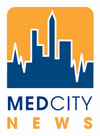
By Thomas Lee
There’s no love lost between St. Jude Medical Inc. (NYSE:STJ) and Boston Scientific Corp. (NYSE:BSX). The two rivals have clashed over sales and salespeople.
So it’s no surprise that St. Jude officials invented a special phrase to describe its competitor’s most recent regulatory woes: “the Boston Debacle.”
Capitalizing on BSX’s temporary shutdown of its implantable cardioverter defibrillator (ICD) business, the Little Canada, Minn.-based company said total cardiac rhythm management sales, including ICDs and pacemakers, jumped 11 percent to $752 million during the first quarter. The company estimates it generated $20 million to $25 million of those Q1 sales from BSX’s shipment hold and added two or three cents to its first-quarter profit of 73 cents a share ($238.6 million).
In a conference call with analysts, CEO Dan Starks said it was too early to guess on how much market share STJ could eventually pick up.
“We’ll have to wait and see,” Starks said. “We don’t know how to model this. We’ve never been in this circumstance before.”
Starks said St. Jude probably gained a full share point so far. But he also noted the Boston Scientific debacle would have no “material effect” on the global CRM market, which will grow four percent to six percent this year.
Starks wasn’t as cautious when an analyst asked him about BSX cutting prices to woo back customers.
“We worry about it,” he said. “But generally, price cuts are an admission of competitive weakness and customers see it that way too. Boston Scientific has an increasingly uncompetitive product line with its numerous FDA advisories and instability in its operations. The perception by customers is that you get what you pay for.”
Even without BSX’s woes, St. Jude had an excellent quarter. Overall revenues grew 11 percent to $1.26 billion, from $1.13 billion during the same period last year. The company’s fastest-growing segments, its atrial fibrillation and neurostimulation businesses, saw sales soar 17 percent to $170 million and 15 percent to $84 million, respectively.
As of 11:30 a.m CST., the company’s stock was up 2 percent, to $41.83.

